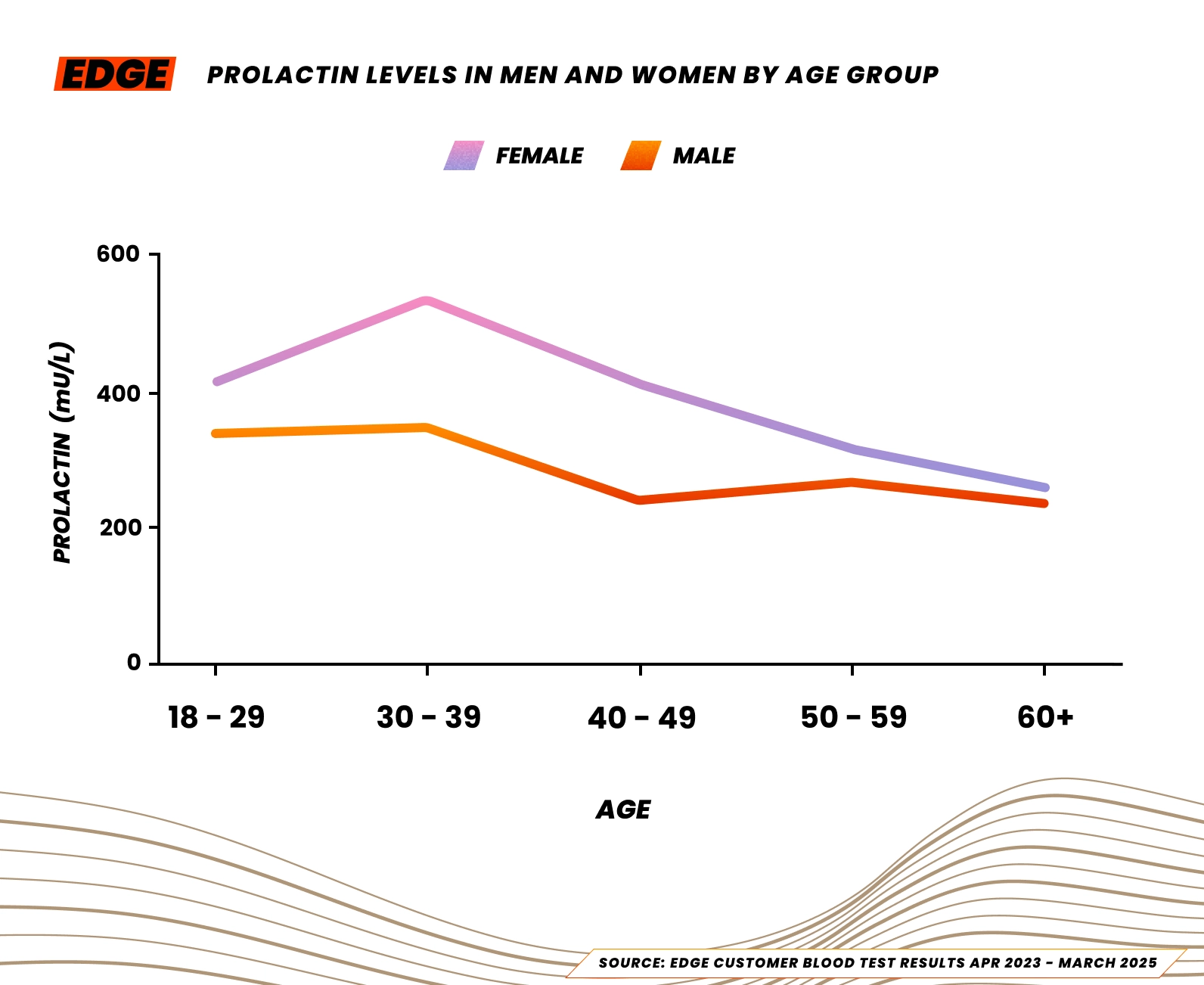What is Prolactin & why is it important for athletes?
1 min read
Published on
May 22, 2025
Written by
EDGE
Share this article
What Is Prolactin?
Prolactin is a hormone produced by the pituitary gland, mainly known for its role in lactation. However, in both men and women, elevated prolactin can disrupt the balance of sex hormones like testosterone and oestrogen, affecting mood, libido, recovery, and performance.
Prolactin can reveal hidden hormonal imbalances, particularly in athletes experiencing fatigue, low libido, or cycle irregularities.

"Prolactin affects reproductive health and stress response. Elevated levels can suppress testosterone or menstrual function, particularly in athletes under chronic stress or high training volumes. I recommend testing if you’re experiencing low libido, fatigue, or cycle disruption – and combining with LH, oestradiol or testosterone for a broader hormonal profile."
What are normal prolactin levels for athletes?
We looked at blood test data from EDGE customers and found the median prolactin levels for women are 411 mU/L and 287 mU/L for men.
Here is a breakdown of prolactin levels by age:
| Table 1: Prolactin Levels in Men and Women by Age Group (mU/L) | ||
| Age Group | Female | Male |
| 18-29 | 407 | 324 |
| 30-39 | 504 | 326.5 |
| 40-49 | 405 | 254 |
| 50-59 | 321 | 276 |
| 60+ | 266 | 252 |
Source: EDGE customer blood test results Apr 2023 – March 2025.
The labs we used to analyse blood samples state a healthy range for prolactin is generally between 102 – 496 mU/L for women and 86 – 324 mU/L for men.

Performance Impacts of High Prolactin
-
Hormonal Suppression
Elevated prolactin can reduce testosterone production in men and disrupt menstrual function in women, leading to energy dips and poor recovery.
-
Mental Performance
High prolactin has been associated with anxiety, brain fog, and low motivation.
-
Recovery and Sleep
Hormonal imbalances involving prolactin may impact sleep cycles, mood, and recovery efficiency.
Symptoms of Elevated Prolactin in Athletes
-
Reduced libido or disrupted sexual function, often overlooked but linked to hormonal imbalance
-
Irregular or absent periods in women – a potential red flag for RED-S or overtraining
-
Persistent fatigue that doesn’t improve with rest or tapering
-
Mood swings, low motivation, or increased irritability that can affect focus and consistency
-
Difficulty building strength or muscle mass despite progressive training and adequate fuelling
Why Test Prolactin?
-
To investigate low testosterone or disrupted menstrual cycles
-
When fatigue or mood changes appear despite solid training habits
-
If other hormones (LH, FSH, testosterone, oestradiol) are out of range
-
To monitor long-term hormonal health and recovery
In Summary
-
Prolactin affects testosterone, oestrogen, and reproductive health
-
High levels may impair recovery, mood, and strength
-
Useful in unexplained fatigue or hormonal dysfunction
-
Should be tested alongside full hormonal panel for context
Check Your Prolactin Levels
Check and monitor your prolactin levels from home with our sports blood tests.
Get 10% off your first order
Want regular tips on how to make the most of your results? Join our newsletter and we'll give you 10% off your order!
Get the knowledge
Get expert advice to help you improve your results.
Go to our knowledge center


